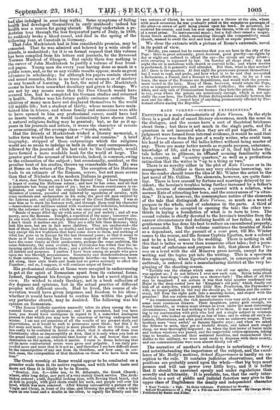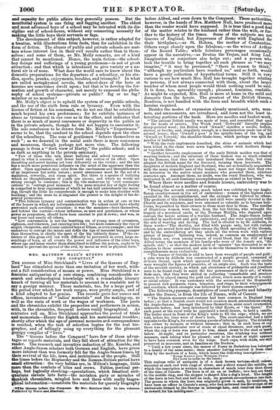KATE TERNON—SCHOOL EXPERIENCES.' EMPTINESS is a main characteristic of Kate
Vernon. In the style- there is a good deal of smart literary cleverness, much the same in the dialogue, and the scenes have a sort of theatrical briskness about them ; but there is not much in the single parts, and the quantum is not increased when they are all put together. If a judgment were formed from internal evidence, it would be said that Kate Vernon was from the pen of a ready writer, who could turn his hand to all classes of the belles lettres without being master of any. There are many better novels as regards purpose, substanee, knowledge. of life, and a true ciepiction of it, that fall below the tale before us in glibness; an hffhand 'seeming familiarity with town, country, and "'country quarters," as well as a pretentious. intimation that the writer is up to a thing or two." There is no novelty either in the plot of Kate Vernon or in its management. Neither is there any very obvious borrowing, un=.; less the reader should trace the idea of Mr. Winter the artist to the novel of Mr. Collins. The elements, however, are quite fami- liar. There is love crossed by fortune and marriage delayed by ac- cident; the heroine's troubles being further increased by a father's. death, reverse of circumistances, a quarrel with a relation, who accuses Kate of attracting her beau, and the annoyances of "a situa- tion." It is not, however, the commonplace nature of the element& of the tale that distinguish Kate Vernon, so much as a want of purpose in the whole, and of substance in the parts. A third of the first volume is occupied in opening the tale ; the other two- thirds in laying a foundation of what is to turn to love. The second volume is chiefly devoted to the heroine's troubles from the narrow circumstances and declining health of her father, an Irish. gentleman who has done his best to reduce an encumbered property, and succeeded. The third volume continues the troubles of Kate as a dependant, and the pursuit of a roué peer, till Mr. Winter comes to the rescue, and the former Captain Egerton, now a colonel and to be a lord, comes to the wedding. There is nothing in all this that is better or worse than numerous other tales ; but a pecu- liar want of substance and purpose is felt, that places Kate Ver- non on a level with the old Minerva press novels, except for its writing and the topics put into the writing. This is a specimen from the opening, when Egerton's regiment, in consequence of an outbreak, is ordered into a manufacturing district at the very be-
ginning of the shooting-season.
"Terrible was the change which came o'er all our spirits; everything was against us; I do not believe I ever saw such rain. Byron talks about 'Nature's tear-drops,'—she gave us a shower-bath ! The effect of all this may be imagined. I am certain it was that fatal quarter confirmed our Major in the deep-rooted love for Kingston's old port,' which finally out him off at sixty-five, while pretty little Mrs. Pemberton, the Paymaster's wife, no longer guided in the way she should go, by fashion and the aristo- cracy, fell from the right path into a meeting-house, and eloped with the preacher ! But our rulers care little for our morals.
"Au commencement, the rich manufacturers were very civil, and gave us some most enormous dinners. Their daughters, pretty girls enough, we found tolerable, as women must always be even under the most die circumstances; but we had nothing to talk of to them. It was so confound-
intres g to try conversation with girls who had not a single subject in common with you ; who looked on sporting as loss of time, and to whom all one's al- lusions, illustrations, and even good stories, were an unknown tongue. Their brothers were very awful,' as Sammy Spectre says ; and when we asked the fellows to mess,- they got so brutally drunk, and talked such stupid slang, we were thoroughly disgusted : so, when the first terror of burnt mills and broken windows was passed, and the respectable cotton-spinners, taking time to breathe, collected their scattered faculties, and remembered their dislike to the military, we were most ready to dispense with their society, and our communications were soon almost totally cut off."
The narrative of another's school-days is notoriously a lore; and notwithstanding the importance of the subject, and the excel- lence of Mr. Melly's motives &hoot Experiences is hardly an ex- ception to the rule. It contains judicious observations, and the positions are probably sound upon the whole—that biF boys must possess and will use power over little boys, and it is better that it should be exercised openly and under regulations thah secretly and arbitrarily. It is probable, too, that the early intro- duction to a sort of public and judicial function may give to the upper class of Englishmen the manly and independent character • Kate ernon :a Tate. Ist three volumes. Published by Newby. School Experiences of a Fag at a Private and Public School. BrGeorgehiellf.
Published:ay limith mid. Alder. and capacity for public affairs they generally possess. But the monitorial system is one thing and fagging another. The eldest and most advanced boys of a school may be intrusted with its dis- cipline out of school-hours, without any connecting necessity for making the little boys their servants or fags.
The development of this subject, however, is rather adapted for a treatise, with illustrations from facts, than for exhibition in the form of fiction. The abuses of public and private schools are mat- ters whose interest lies in their evil results rather than in them- selves ; and some of them, as Mr. Melly remarks, are of a kind that cannot be mentioned. Hence, the main fiction—the school- boy doings and sufferings of a young gentleman—is not of great attraction ; and that which is introduced to give variety or a na- tural air is of none. What does the world care to know about the domestic preparations for the departure of a schoolboy, or his stu- dies, sports, pranks, enjoyments, troubles, and triumphs ? In what are wiled metaphysical novels, the school-days of the hero or heroine are sometimes dwelt upon; but that is to develop the for- mation and growth of character, not merely to expound the philo- sophy of school systems—private or public ? fag or no fag ? monitor or no monitor ?
Mr. Melly's object is to uphold the system of our public schools, and the use of the sixth form rule or tyranny. Even with the licence of fiction at his command, we do not see that he establishes much beyond his own preferences ; for he exhibits instances of abuse as tyrannical in one case as in the other, and indicates that there is as much of moral coarseness or depravity in the public as in the private schools, though he did not happen to encounter it. The sole conclusion to be drawn from Mr. Melly's "Experiences" seems to be, that the conduct in the school depends upon the class of the schoolboys. The sons of gentlemen "behave themselves as such "; as we descend in the social scale there is more coarseness and meanness, though perhaps not more vice. The following passage is from a "dark view of Herby," the public school; and is as dark as anything in the private serninary. "Few of those who talk about bullying and school tyranny under- stand in what it consists ; still fewer have any notion of its effect. Open thrashing and secret teasing act very differently on the victim ; and the one has a much more pernicious influence on the mind of the aggressor than the other. Open aggression may arise from the carelessness and thoughtlessness of an impetuous but noble nature ; secret annoyance must be the act of a malicious, cowardly, and mean spirit. But there is a species of bullying which no thoughtlessness of youth can excuse, and which no words are strong enough to condemn ; this is the vile endeavour by evil comtnuni- cations' to corrupt good manners.' The pure-minded boy of right feeling is compelled to hear expressions of which he but half understands the mean- ing, though the little he comprehends is enough to make him shudder with loathing; and the more he is disgusted. the greater is the delight of hie de- praved persecutors.
"This hideous tyranny and contamination was in action at one or two of the houses in which my informantsresided. No ushers could have wholly prevented such revolting atrocities : it was the monitors—boys themselves, mid behind the curtain—whose influence, as men and gentlemen, or whose power as praipostors, should have been exerted to put it down; and was, in our house and nearly all others.
"Low conversation is not the besetting sin of young men of seventeen, eighteen, and nineteen, just entering into life; but more commonly the vice of stupid, overgrown, and coarse-minded boys of fifteen, or even younger ; and the 'endeavour to corrupt the minds and defile the lips of innocent boys, younger than themselves, is chiefly the sport of the big lubberly dunce. If the ex- istence of this gross evil can with difficulty be prevented in every large as- semblage of boys, at all events the power and influence of the elder boys, whose age and sense render them disinclined to diffuse the poison, ought to be exerted to prevent the spread of the evil, by moral as well as physical force."



























 Previous page
Previous page